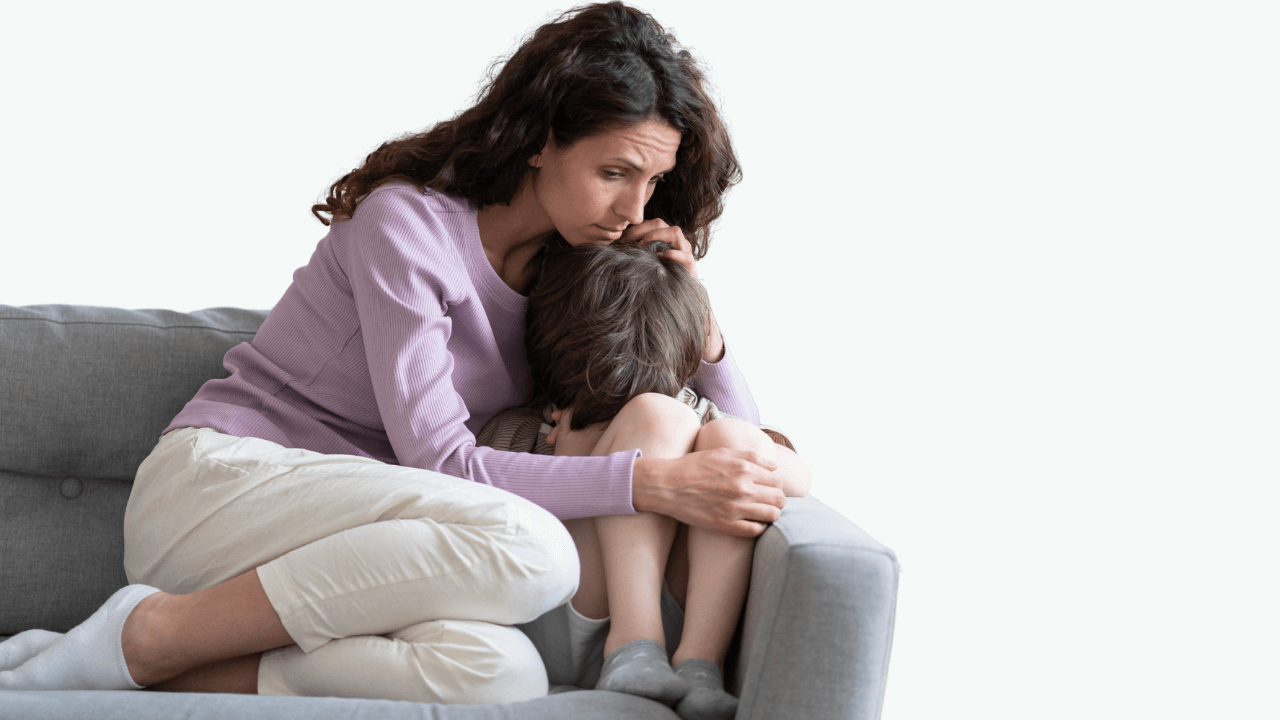

Parents or caregivers may experience parental anxiety, which is an emotional state characterized by excessive fear, worry, or stress.
They may encounter anxiety as they navigate the responsibilities of nurturing and protecting their children. It could stem from concerns about different aspects of their child’s life, like development, health, academic performance, and safety concerns.
A certain level of anxiety may be motivating and beneficial. However, excessive parental anxiety could have adverse effects on both the caregiver and the child.
This article will give you a complete understanding of parental anxiety, including its symptoms, causative factors, and impact on children and caregivers. It will also mention evidence-based prevention strategies against parental anxiety.
Parental anxiety specifically correlates to parents or caregivers. It may affect people caring for children of any age, from infancy to adulthood.
Caregivers experiencing parental anxiety may exhibit signs like insomnia, irritability, excessive worrying, and avoidance behaviors.
Parental anxiety may lead to overprotective behaviors as caregivers/parents try to shield their children from harm. However, such overprotective tendencies may hinder a child’s ability to develop necessary life skills and independence.
To better understand parental anxiety, let’s look at the following table:
| Key Points | Description |
|---|---|
| Definition | Anxiety experienced specifically by parents or caregivers |
| Impact on Children | It might lead to overprotective behaviors, hindering the child’s independence and problem-solving skills |
| Developmental Stage | May occur at any point during a child’s growth, from infancy to adulthood |
| Coping Strategies | Managing anxiety can support the child’s growth and independence while reducing caregiver stress |

Factors triggering parental anxiety may arise due to concerns regarding a child’s emotional, social, and mental well-being. Parents may experience heightened anxiety based on the following factors:
Mindfulness may help caregivers to observe their thoughts and feelings without judgment, leading to better emotional regulation. It might help in responding to challenging situations with greater clarity and composure.
Engaging in mindfulness techniques like deep breathing, meditation, or yoga could reduce stress hormones. Such effects may promote relaxation and enhance the cognitive well-being of parents/caregivers.
Through mindfulness, parents may enhance their ability to focus on the present moment, improving concentration and decision-making skills.
The heightened awareness helps parents to establish open communication with their children, fostering stronger connections and understanding.
CBT or cognitive behavioral therapy may concentrate on improving the relationship between one’s feelings, thoughts, and behaviors. Research has indicated CBT to be an effective treatment for anxiety, offering benefits for those struggling with parental anxiety.
Engaging in CBT may provide you with practical tools to rectify negative thought patterns contributing to your anxiety.
Through CBT, you may develop a personalized set of skills tailored to your anxiety triggers and reactions. It may redirect your thinking patterns and help improve the parent-child relationship, especially for people with parental anxiety.
Stress management techniques for alleviating parental anxiety may include practicing meditation, mindfulness, yoga, or deep breathing exercises. Engaging in these practices may soothe the mind, helping mitigate elevated stress/anxiety.
Exercise is a powerful stress reliever that may curb parental anxiety. Physical activity may stimulate endorphins release, which are natural mood lifters that improve mental well-being.
Consuming nutrient-rich foods may positively impact mood and energy levels, contributing to a more stable emotional state. Avoid mood-altering substances like excessive caffeine or alcohol, as they might exacerbate feelings of anxiety.
Getting enough sleep is vital in managing stress levels. Adequate rest allows caregivers to approach parenting challenges with a clear mind, increased energy, and more patience.
Parents should create and implement a structured schedule accommodating caregiving responsibilities and personal well-being.
Make time for yourself each week to engage in activities that bring joy and relaxation. Whether reading a book, spending time in nature or pursuing a hobby, prioritizing self-care is essential for managing parental anxiety.
Establishing a daily routine may provide structure and predictability, reducing feelings of chaos and overwhelm. Include set times for meals, rest, playtime, and self-care activities to create a more organized environment for yourself and your child.
Don’t hesitate to delegate tasks to other family members or seek help from friends or professionals. Sharing responsibilities could lighten the load and free up time for self-care.
Effective coping skills are essential for managing parental anxiety and promoting a healthy family dynamic. Self-care practices like writing a journal, engaging in a constructive hobby, yoga, or reading a book may be effective coping mechanisms against parental anxiety.
Demonstrating these coping strategies to children could teach them how to cope with stress and build resilience. Children often mirror the behavior they observe, so maintain a calm demeanor in front of children, paying attention to facial expressions and word choice.
Preparing in advance against situations that may provoke parental anxiety regarding the child’s health, safety, or wellness could minimize parental anxiety episodes.
Here are three practical steps caregivers may take to avoid catastrophes and potentially minimize parental anxiety episodes:
Medication is not always the first line of treatment for parental anxiety. However, a doctor may prescribe certain medications to parents/caregivers with severe or persistent parental anxiety episodes.
Here are some common medications that may be prescribed to reduce parental anxiety:
Parents/caregivers struggling with parental anxiety may exhibit signs like irritability, insomnia, excessive worrying, and avoidance behaviors.
Avoidance behaviors may present as prohibiting children from engaging in age-appropriate activities due to fear of harm or negative outcomes. Caregivers might resort to drugs or alcohol to cope with their anxiety, further exacerbating the situation.
Expecting the worst is another common sign of parental anxiety, where caregivers tend to anticipate the most negative outcomes rather than considering a range of possibilities.
Parental burnout, characterized by emotional and physical exhaustion after prolonged periods of anxiety, may be a prevalent consequence. Parents struggling with anxiety may overreact to minor issues, feel constantly on edge, and become easily distracted.
Recognizing these signs and seeking appropriate support, like therapy or stress management techniques, is crucial in addressing parental anxiety.
Also See:
Parental anxiety may negatively impact a child’s emotional well-being and development.
Research indicates an increased risk of anxiety and depressive disorders in children whose parents have severe anxiety. It may give rise to separation anxiety disorder, specific phobias, depressive disorders, and generalized anxiety disorder in children.
Children of caregivers who experience parental anxiety may exhibit reluctance to try new things, catastrophizing, and a belief that the world is not safe.
Children may fear expressing their own anxiety or negative emotions to overwhelmed parents, leading to low self-esteem.
Children absorb the stress and worries of their caregivers, potentially internalizing these anxieties and developing their mental health challenges.
Therefore, timely managing parental anxiety is essential to create a healthier emotional atmosphere for the child.
Parents/caregivers may face emotional and psychological challenges due to unregulated parental anxiety episodes.
It may result in intense emotional turmoil for parents, including worry, fear, guilt, and inadequacy. These emotions may impact a parent’s mental well-being.
The effects of parental anxiety could also manifest physically. Parents may experience symptoms such as headaches, fatigue, muscle tension, and excessive digestive issues due to the constant stress and worry.
Parental anxiety may strain relationships with partners, family members, and friends. The constant preoccupation with their child’s well-being may induce conflicts, isolation, or difficulty in seeking and accepting help from others.
Parents experiencing heightened anxiety should prioritize self-care, seek professional support if needed, and engage in open communication with children. Doing so may help manage and minimize parental anxiety.
| Signs to Seek Professional Help | Description | Action |
|---|---|---|
| Feeling Overwhelmed | If anxiety feels unmanageable and affects your daily functioning | Contact a mental health professional |
| Impacting Relationships or Work | When anxiety interferes with relationships or job performance | Seek guidance from a therapist |
| Recognizing Anxiety Symptoms | Identifying signs such as constant worry, restlessness, or panic attacks | Consult a doctor or psychologist |
| Persistent Distress | Experiencing ongoing emotional pain or suffering | Reach out to a counselor or support group |
| Decline in Well-being | Noticing a decline in your overall mental health and quality of life | Consider therapy sessions or medication under professional supervision |
Parental anxiety is a common concern that may have significant impacts on both parent and child. Understanding the triggers, signs, and impact of parental anxiety could help the parents/caregivers develop and implement effective coping mechanisms.
Mindfulness practices, seeking help from other parents/support groups, and openly communicating with co-parents about parental anxiety could help manage it effectively.
Seeking professional help is required when anxiety significantly impacts your daily life or the well-being of your child. Medical treatment interventions against parental anxiety may include dialectical behavior therapy, family therapy, or medications under medical supervision.
Tyler Read earned an undergraduate academic degree from Sonoma State University, California and is a certified personal trainer (CPT) with NASM (National Academy of Sports Medicine). With over 16 years of experience, Tyler has trained clients both online and in-person.
He is passionate about helping others turn their love for fitness into a career. Tyler has worked with many local and commercial gyms before establishing his successful private personal training business, which he continues to operate.
